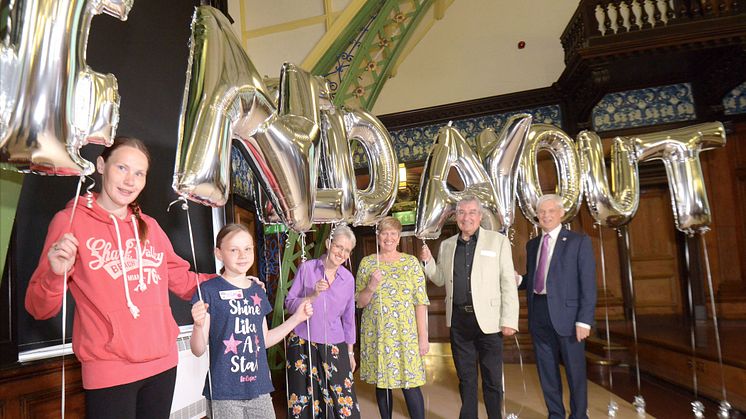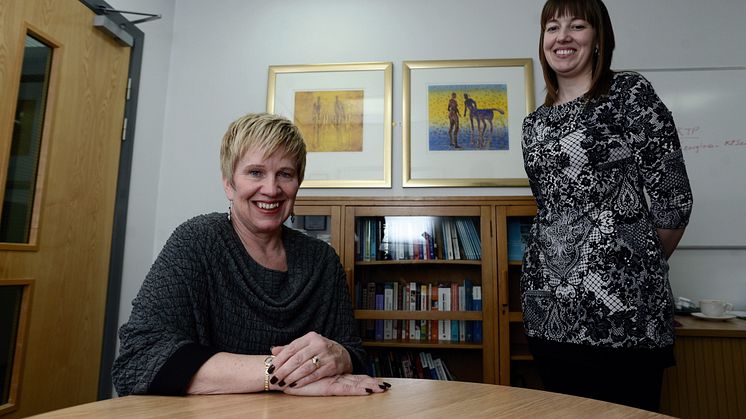
Press release -
Holiday clubs provide far more benefits beyond just providing food, study reveals
The largest study of school holiday clubs in England has found that as well as helping to combat childhood hunger, holiday clubs provide a number of social and health benefits including providing children a safe place to play.
The extensive findings of the study were released today (Wednesday 30 May) at a special event at the Discovery Museum, Newcastle upon Tyne.
The A Day Out, Not a Handout project was established by the North East Child Poverty Trust, and delivered by Children North East, in response to the impact of ‘holiday hunger’ as a key issue for struggling families in the North East. The Trust was keen to develop and test a programme of holiday clubs that would address the nutritional and wellbeing needs of children in a coordinated and consistent manner.
Academics from Northumbria University’s Healthy Living Lab were enlisted to undertake a major evaluation of the holiday clubs to explore the potential relationship between club provision and children’s health, nutrition and wellbeing, as well as the impact clubs had on parents.
Thanks to funding from the National Lottery, through the Big Lottery Fund, 17 holiday clubs were established in four different areas of the North East. They provided over 600 children with more than 3,000 breakfasts, 7,000 lunches and a varied and stimulating programme of activities during the summer 2017 holidays.
More than 600 children aged between 5-14 engaged in activities including growing and cooking foods, arts and crafts, sports and games, storytelling and day trips to beaches and cultural areas, such as National Trust sites.
A total of 133 parents participated in a mix of interviews and surveys to share their experiences. The researchers found that holiday clubs helped in alleviating parental stress and improved overall parental health and wellbeing. In addition, parents highlighted how clubs provided their children with safe places to play, opportunities to learn new skills, and to engage in a range of new experiences.
A Day Out, Not A Hand Out from Northumbria University on Vimeo.
Professor Greta Defeyter, Director of Northumbria University’s Healthy Living Lab, said: “We have extensive expertise in researching the impact of holiday clubs on children’s hunger, social relationships and educational attainment, as well as the impact on families and wider communities. However, this study – which is the largest ever to be conducted in England – has produced some notable findings.
“Our findings suggest that holiday club provision offers the potential to have a far wider impact than previously evidenced on children’s health, wellbeing and education.
“Importantly, we collected robust quantitative data that enabled the researchers to conduct statistical testing.
“The Northumbria University team found that children’s diets significantly improved on the days the children attended holiday clubs, compared to the days they didn’t attend. They consumed more core foods such as protein, dairy, grains and cereals, as well as fruits and vegetables. They drank fewer sweetened drinks and drank water more frequently.
“The holiday clubs encouraged children to have new experiences with food, providing them with opportunities to cook and grow fruit and vegetables. The children reported that they enjoyed trying new foods that they had not previously eaten and that they had gained knowledge in food and nutrition. Parents reported that this transferred to their home environments, with their children wanting to help prepare and cook family meals.
“The consistent theme of ‘safety’ reported by children, parents and staff was quite remarkable and something not previously reported.
“Our findings revealed that activities provided at clubs are one of the most highly valued aspects of this provision, both by children and parents. The parental data provide clear insight into difficulties parents often face during the holidays including difficulties in finding and paying for childcare, and general cuts in child and youth services in local communities.”
The children engaged more frequently in physical activity and reported that they enjoyed exercise more on the days they attended the clubs. This was accompanied by a decrease in the amount of time that they spent playing video games on computers, games consoles, phones and other devices. Children stated that they enjoyed attending holiday club because they participated in a variety of activities that they did not normally have access to during the summer holidays.
Professor Defeyter added: “This project was extremely successful. The project engaged a significant number of children, provided healthy food compliant with School Food Standards, increased children’s participation in physical activities and improved parental wellbeing. There was also clear evidence of children’s learning transferring into their home environment. Importantly, the clubs provided parents with the peace of mind that their children were in a safe environment and not unsupervised or on the streets where they could become targets of abuse or violence.”
Mike Worthington, Chair of the North East Child Poverty Trust, said: “The success of the project was very much due to its collaborative nature. The diversity of different organisations working together was a powerful force. The findings of the research are equally powerful. Because of this, we hope that this will not just be a one-off project, but the beginning of something big.”
Jeremy Cripps, CEO at Children North East, said: “Children North East was delighted to coordinate this major project with our partners, which has demonstrated the importance of good food and stimulating activities for children whose parents are suffering financial hardship during the long summer holidays.”
Northumbria’s Healthy Living lab is already renowned for its research into childhood hunger. Research from the centre has helped to evidence the need for school breakfast clubs and free school meals to alleviate hunger and improve educational attainment. They have found that in some cases, parents are left with no option but to skip meals and rely on cheap, processed food to ensure their children have enough to eat during the holidays.
Experts from the centre have been called upon to present their findings to the All Party Parliamentary Group on Hunger, which is looking into the extent of hunger amongst children during the school holidays.
<iframe src="https://player.vimeo.com/video/272599943?color=ffffff" width="640" height="360" frameborder="0" webkitallowfullscreen mozallowfullscreen allowfullscreen></iframe>
Holiday clubs research findings from Northumbria University on Vimeo.
Pictured L-R: Parent Clare Hutchinson and her daughter Chloe Currie who attended the Bridgewater Primary School holiday club in Benwell, Newcastle; with child food poverty policy adviser Lindsay Graham; Professor Greta Defeyter of Northumbria University; Mike Worthington of the North East Child Poverty Trust and Jeremy Cripps of Children North East
Topics
Northumbria is a research-rich, business-focused, professional university with a global reputation for academic excellence. To find out more about our courses go to www.northumbria.ac.uk
If you have a media enquiry please contact our Media and Communications team at media.communications@northumbria.ac.uk or call 0191 227 4604.








